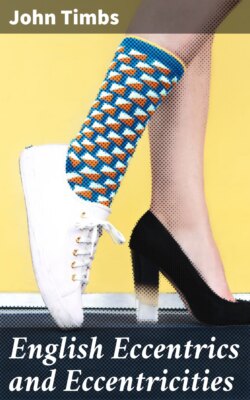Читать книгу English Eccentrics and Eccentricities - John Timbs - Страница 31
На сайте Литреса книга снята с продажи.
"Lady Lewson," of Clerkenwell.
ОглавлениеTable of Contents
In Cold Bath Square, for the space of ninety years, lived Mrs. Lewson, commonly called "Lady Lewson," from her very eccentric manner of dress. She was born in the year 1700, in the reign of William and Mary, in Essex Street, Strand, of respectable parents named Vaughan; and she was married at an early age to Mr. Lewson, a wealthy gentleman, then living in Cold Bath Square, in the house wherein she subsequently continued to reside. She became a widow at the age of twenty-six, having only one daughter living at the time. She was left by her husband in affluent circumstances; she preferred to continue single, and remained so, although she had many suitors. When her daughter married, Mrs. Lewson was left alone, and being of retired habits, she rarely went out, or permitted the visits of any person. During the last thirty years of her life, she kept only one servant, an old woman, who died after a servitude of twenty years: she was succeeded by her grand-daughter, who marrying, was replaced by an old man, who attended the different houses in the Square to go of errands, clean shoes, &c. "Lady Lewson" took this man into her house, and he acted as her steward, butler, cook, and housemaid; and with the exception of two old lapdogs and a cat, was her only companion.
The house in which she lived was large and elegantly furnished; the beds were kept constantly made, although they had not been slept in for about thirty years. Her apartment was only occasionally swept out, and never washed; and the windows were so encrusted with dirt, that they hardly admitted a ray of light. She used to tell her acquaintances that if the rooms were washed, it might be the occasion of her catching cold; and as to cleaning the windows, many accidents happened through that ridiculous practice—the glass might be broken, the person who cleaned them might be injured, and the expense would fall upon her. There was a large garden in the rear of the house, which she kept in good order; and here, when the weather was fine, she sometimes sat and read, or chatted of times past with such of her acquaintances as she could be persuaded to admit. She seldom visited, except at the house of a grocer in Cold Bath Square, with whom she dealt. She had survived many years every relative, and was thus left to indulge her odd tastes.
She was so partial to the fashions that prevailed in her youthful days, that she never changed the manner of her dress from that worn in the time of George I., being always decorated
With ruffs, and cuffs, and fardingales.
She always wore powder, with a large tache, made of horsehair, upon her head, over which the hair was turned, and she placed the cap, which was tied under her chin, and three or four rows of curls hung down her neck. She generally wore a silk dress, with a long train, a deep flounce all round, and a very long waist; her gown was very tightly laced up to her neck, round which was a ruff or frill; the sleeves came down below the elbows, and to each of them four or five large cuffs were attached; a large bonnet, quite flat, high-heeled shoes, a large black silk cloak trimmed with lace, and a gold-headed cane, completed her every-day costume for eighty years; in which dress she occasionally walked round the Square. She never washed herself, because she thought those persons who did so were always taking cold, or engendering some dreadful disorder; her method was to besmear her face and neck all over with hog's-lard, because that was soft and lubricating; and because she wanted a little colour on her cheeks, she bedaubed them with rose-pink. Her manner of living was very methodical: she would only drink tea out of one cup, and always sat in her favourite chair. She enjoyed good health, and entertained the greatest aversion to medicine. At the age of eighty-three, she cut two new teeth, and she was never troubled with tooth-ache. She lived in five reigns, and had the events of the year 1715 (the Scottish Rebellion) fresh in her recollection.
The sudden death of an old lady who was a neighbour made a deep impression on Mrs. Lewson; believing her own time had come, she became weak, took to her bed, refused medical aid, and on Tuesday, the 28th of May, 1816, died at her house in Cold Bath Square, at the age of 116; she was interred in Bunhill Fields burying-ground. "At her death," says Mr. Warner, in his MS. Notes on Clerkenwell, "I went over the house, and was struck with astonishment at the number of bars, bolts, &c., to the whole of the doors and windows; the ceilings of the upper floor were completely lined with strong boards, braced together with iron bars, to prevent any one getting into the house from the roof. The ashes had not been removed for many years; they were neatly piled up, as if formed into beds for some particular purpose, around the yard. Her furniture, &c., were sold by auction, and persons were admitted to view by producing a catalogue, which was sold at sixpence, and would permit any number of persons at one time."[10]
